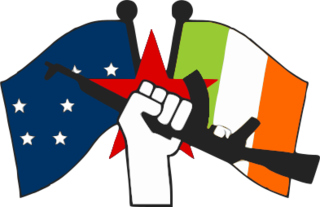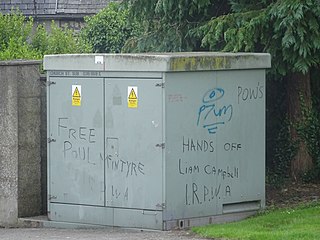The Real Irish Republican Army, or Real IRA (RIRA), was a dissident Irish republican paramilitary group that aimed to bring about a United Ireland. It was formed in 1997 following a split in the Provisional IRA by dissident members, who rejected the IRA's ceasefire that year. Like the Provisional IRA before it, the Real IRA saw itself as the only rightful successor to the original Irish Republican Army and styled itself as simply "the Irish Republican Army" in English or Óglaigh na hÉireann in Irish. It was an illegal organisation in the Republic of Ireland and designated as a proscribed terrorist organisation in the United Kingdom and the United States.

The Irish National Liberation Army is an Irish republican socialist paramilitary group formed on 8 December 1974, during the 30-year period of conflict known as "the Troubles". The group seeks to remove Northern Ireland from the United Kingdom and create a socialist republic encompassing all of Ireland. With membership estimated at 80–100 at their peak, it is the paramilitary wing of the Irish Republican Socialist Party (IRSP).
Michael McKevitt was an Irish republican and paramilitary leader. He was the Provisional Irish Republican Army's Quartermaster General. Due to the Provisional IRA's involvement in the Northern Ireland peace process, he formed the Real IRA in protest. His role in the Real IRA led to him being convicted of directing terrorism as the leader of the paramilitary organisation.
Thomas McMahon is a former volunteer in the South Armagh Brigade of the Provisional Irish Republican Army (IRA), and was one of the IRA's most experienced bomb-makers. McMahon was convicted of the murder of Lord Louis Mountbatten and three others off the coast of Mullaghmore, County Sligo, in the west of Ireland.

Cathal Goulding was Chief of Staff of the Irish Republican Army and the Official IRA.
Patrick Joseph Magee is a former Provisional Irish Republican Army (IRA) volunteer, best known for planting a bomb in the Brighton Grand Hotel targeting Prime Minister Margaret Thatcher and her Cabinet, which killed five people. He is often referred to as the Brighton bomber.
Eamon Collins was a Provisional Irish Republican Army member in the late 1970s and early 1980s. He turned his back on the organisation in the late 1980s, and later co-authored a book called Killing Rage detailing his experiences within it. In January 1999 he was waylaid on a public road and murdered near his home in Newry in Northern Ireland.
Sean Kelly, is a former Irish volunteer in the Belfast Brigade of the Provisional Irish Republican Army (IRA), who was a member of the active service unit which carried out the Shankill Road bombing in 1993. Kelly was convicted of nine counts of murder, but was released in 2000 as part of the Good Friday Agreement.

Liam Campbell is an Irish republican from Dundalk, County Louth. He was found liable under civil proceedings for the 1998 Omagh bombing, which killed 29 people.
Seamus Daly is an Irish republican from Kilmurray, Castleblayney, County Monaghan. He was charged with being a member of the Real Irish Republican Army (RIRA) in Dublin's Special Criminal Court in 2004, pleaded guilty and was sentenced to three and half years in prison.

Daniel Keating was a lifelong Irish republican and former president of the Republican Sinn Féin. At the time of his death, he was Ireland's oldest man and the last surviving veteran of the Irish War of Independence.
William Joseph Quinn, known as Liam Quinn, is an American former volunteer in the Provisional Irish Republican Army who shot dead Stephen Tibble, an off-duty police officer, in London on 26 February 1975.
Bernadette Sands McKevitt is a founding member of the 32 County Sovereignty Movement.

Brian Keenan was a member of the Army Council of the Provisional Irish Republican Army (IRA) who received an 18-year prison sentence in 1980 for conspiring to cause explosions, and played a key role in the Northern Ireland peace process.
Donna Maguire is a former volunteer in the Provisional Irish Republican Army (IRA) once described as Europe's most dangerous woman.

Angelo Fusco is a former volunteer in the Belfast Brigade of the Provisional Irish Republican Army (IRA) who escaped during his 1981 trial for killing a Special Air Service (SAS) officer in 1980.
Paul "Dingus" Magee is a former volunteer in the Belfast Brigade of the Provisional Irish Republican Army (IRA) who escaped during his 1981 trial for killing a member of the Special Air Service (SAS) in 1980. After serving a prison sentence in the Republic of Ireland, Magee fled to England where he was imprisoned after killing a policeman in 1992. He was repatriated to the Republic of Ireland as part of the Northern Ireland peace process before being released from prison in 1999, and subsequently avoided extradition back to Northern Ireland to serve his sentence for killing the member of the SAS.
This is a chronology of activities by the Provisional Irish Republican Army (IRA), from 1992 to 1999.

Peter Joseph Cleary was an Irish republican and a leading member of the 1st Battalion of the Provisional Irish Republican Army (IRA)'s South Armagh Brigade. He held the rank of Staff Officer and served as the unit's treasurer. He was implicated by journalist and author Joe Tiernan in the killing of Ulster Defence Regiment (UDR) corporal and alleged Ulster Volunteer Force (UVF) member Robert McConnell. Ten days after McConnell's killing, Cleary was shot dead by the Special Air Service (SAS) after being arrested at the home of his girlfriend outside Forkhill. He was the first person in Northern Ireland to be killed by the SAS, following the admission of their deployment there in January 1976. According to the SAS, he was shot after attempting to take the rifle from the officer who was guarding him in a bid to escape.
On 14 November 1992, 3.2 tonnes of explosives was discovered during a routine check on a lorry travelling on Stoke Newington Road, part of the A10, one of the main routes between London and the north. The Volvo lorry was stopped by police around 1 am; the occupants fled. Constable Raymond Hall - a former Royal Engineer soldier and Falklands War veteran - chased the suspects to a residential street, Belgrade Road no.7 where he was shot twice by one of them. Shortly afterwards police arrested one man, Irish lorry driver Patrick Kelly, a member of the Provisional IRA, who was alleged to have been driving the lorry.






